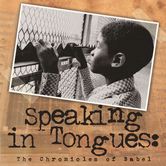| « Sitcom Cast Change Countdown #1: Three's Company | Moneyball, Killer Elite, Restless, Detective Dee and the Mystery of the Phantom Flame & Dolphin Tale » |
Theater Thu Sep 22 2011
Speaking in Tongues: The Chronicles of Babel
For many, the '70s sitcom "Good Times" is seen as the standard when it comes to showcasing life in Chicago's public housing projects; for Shepsu Aakhu, the story is deeper, richer--and untold. Here, the playwright and MPAACT Executive Director discusses Speaking in Tongues: The Chronicles of Babel, and its mission to tell an authentic tale of life in public housing.
A play about life in a public housing project is not something often heard about; how did you get the idea to write Speaking in Tongues: The Chronicles of Babel?
We [MPAACT] do plays about black life and its myriad of representation. The joy for me with this play is that these are really my own family stories.
So the play then, centers on your real-life family that grew up in housing projects.
Yes--these are my family stories. I have two aunts that lived in buildings that faced each other and having gone to Holy Angels, I spent an enormous amount of time in the projects with them.
Having had that experience, is that why you decided to tell this story about them and their life?
There are many stories and quite frankly, I'm continuously being assaulted by the lack of interest in our presence. My wife and I were in a bookstore and it had all these [books about] neighborhoods like Ukrainian Village, Chinatown, etc. You can look at the history of Chicago and see we absolutely do not exist in the pages and accept the fact that you have to chronicle these stories yourself because they're just not happening. Nobody's chronicling the stories of the "urban poor" in any way that's representative of the actual lives that people live. And that becomes interesting.
The story is about real people who have first-hand experience about living in a Chicago housing project. Tell us a little about how it was all put together.
I interviewed and recorded the families and used transcripts of those interviews to put it together, so what will be on stage is as far away from fictionalization as you can possibly get. It is their actual words and about their actual lives--even the characters and their names weren't changed.
Why was it so important to you to not fictionalize the story?
If you give their story the "Hollywood" treatment, you reduce them to the basic conflicts (drugs, gangs, etc.) of their lives which aren't particularly new, but are certainly exploited. What you then end up with is some ridiculous version of "Good Times" on stage. And what all of the Hollywood "project stories" miss is the richness and variety of their lives, which is what we're trying to go for.
What was your family's response when you told them you were writing this play?
My family is accustomed to me putting our family history on stage. That's what part of this was--not about injecting me into the story--it was me getting out the way so they could tell theirs.
As you know, from the people to the actual structures themselves, the whole public housing dynamic is mired in stereotypes--did that have any impact when you wrote the play?
It isn't that there aren't people who fit stereotypes; it's that they never get to tell their stories--their stories belong to politicians, reporters and social service workers with an agenda. I imagine in the course of the play you'll occasionally run into something that's a cliché or a stereotype but the issue is not running into in a way that silences their voice. The story isn't just about the lives of the people, but also the deterioration of the physical environment they live in.
So does the play approach the people or residents in this story as some of Chicago's "forgotten ones?"
It's not a conversation about the politics of the world or how the rest of the world looks at them; it's really just about the day to day struggles of raising a family in this kind of environment. You could draw that conclusion, but I don't know that the play concerns itself with that conversation.
You obviously felt this is an important story to tell; what would you say is the play's "message" as it relates to our current society?
The play's message is about how we continue to experiment with the urban poor--that we don't know what to do with them--that's the central message. This, quite frankly, is the great problem with black stories in popular culture in general--they're always so reduced and we're very seldom allowed to be seen in the complexities we actually exist in--that we can't be anything but stereotyped.
How would you address those who might question a play about life in the projects written by someone who visited but didn't actually live there?
I'm not writing from an outsider's perspective, but the joy is that I'm not the variable anyway. Is [the play] different because they participated? Absolutely. Is it better because I let their voices speak instead of mine? Yes. And that's what you go for.
What do you want people to take away from this play?
The one thing I want is for people to realize that as much representation they've seen of this life, they don't know it. It's possible to take away any number of things, but not so if you've already made up your mind that you know who these people are and what their experience is.
Speaking in Tongues: The Chronicles of Babel, directed by Andrea Dymond, previews through Sep. 24; opens Sunday, Sep. 25 through Oct. 30 at The Greenhouse Theater Center, 2257 N. Lincoln. Show times are Thursdays-Saturdays at 8pm; Sunday shows at 3pm. Tickets are $15-$23. For more information, call 312-409-6724.









